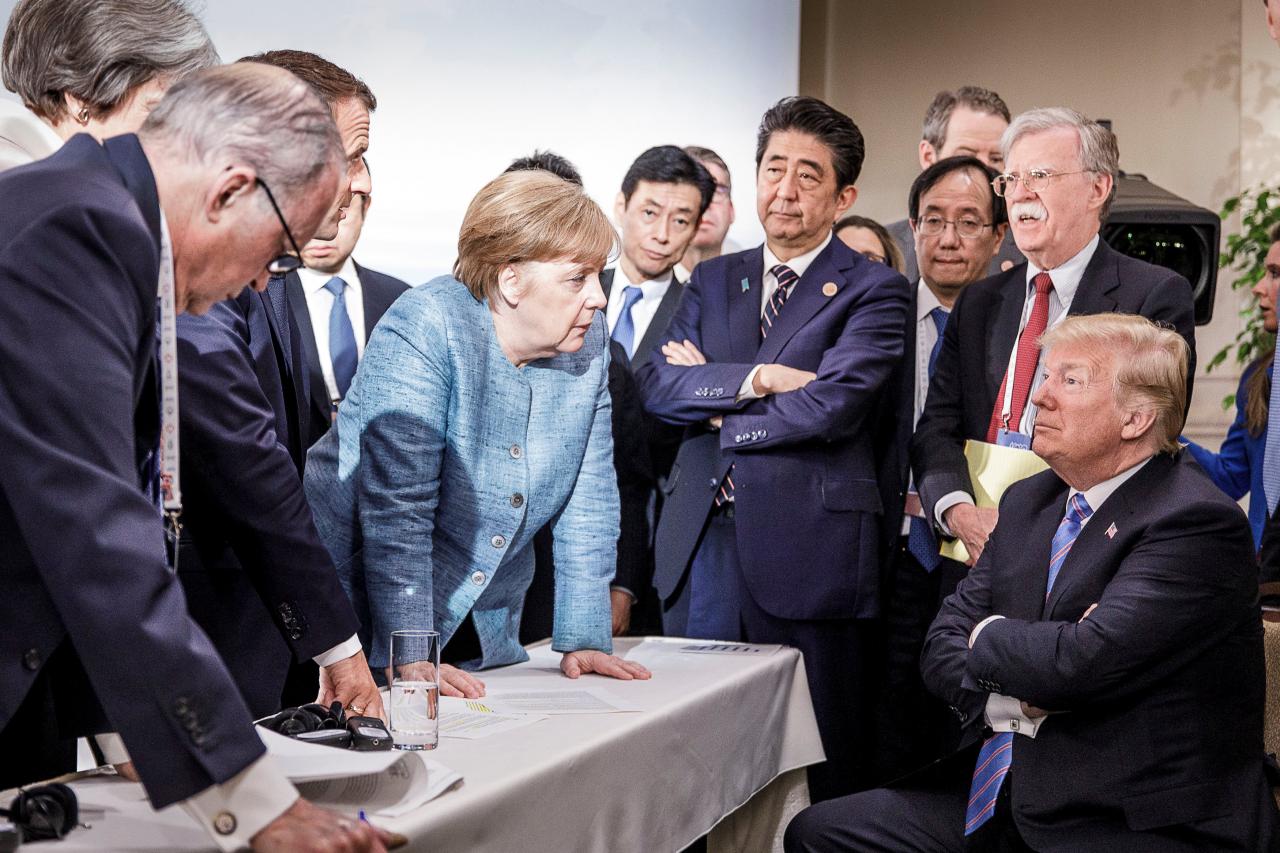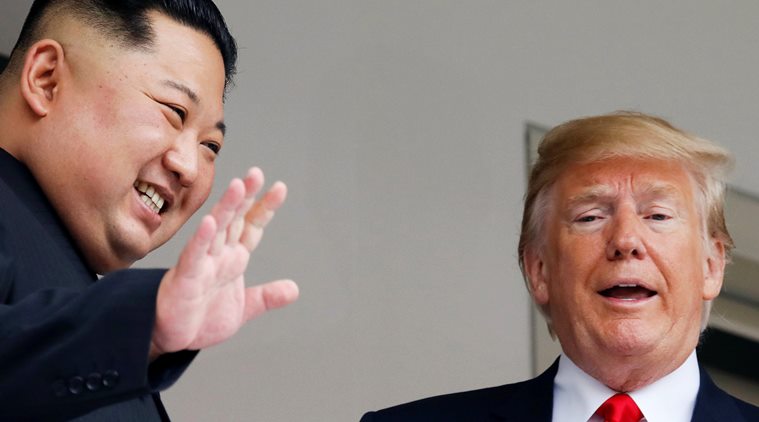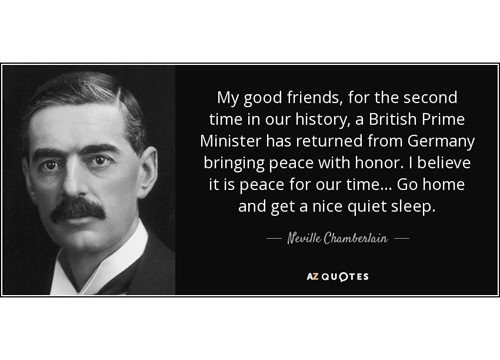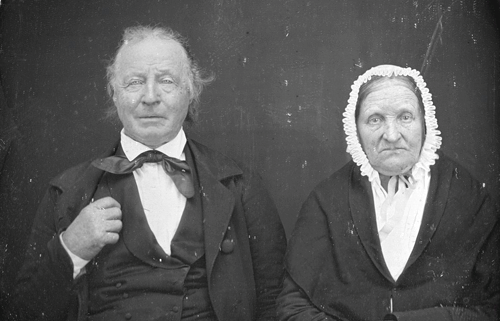Best quote I’ve seen so far about Trump at the Charlevoix Fiasco: “He’s like Heath Ledger’s Joker–but without the operational excellence.” That was from a senior G7 official.
Larry Kudlow was on the morning bobblehead shows today complaining that no one is congratulating Trump for his “successful” G7 Summit. I suppose it was successful in the sense that Trump remembered to put on his pants. I’m not aware that he actually fell out of his high chair at any point. But that’s about all one can say for it.

Before going on to the postmortem of the Fiasco, let us review the economic genius of Larry Kudlow, who became a right-wing media pundit in the 1990s after cocaine and alcohol addiction destroyed his Wall Street career.
It was the eve of the biggest economic collapse since the Great Depression. Many on Wall Street worried that a recession loomed and that the housing bubble was bursting.
And then there was Larry Kudlow, the man President Trump just tapped to be his top economic adviser.
“Despite all the doom and gloom from the economic pessimistas, the resilient U.S. economy continues moving ahead,” Kudlow wrote on Dec. 7, 2007, in National Review, predicting that gloomy forecasters would “wind up with egg on their faces.” Kudlow, who previously derided as “bubbleheads” those who warned about a housing bubble, now wrote that “every positive” news in housing should “cushion” falling home sales and prices.
“There’s no recession coming. The pessimistas were wrong. It’s not going to happen,†wrote Kudlow. “ . . . The Bush boom is alive and well. It’s finishing up its sixth consecutive year with more to come. Yes, it’s still the greatest story never told.â€
If that was the greatest story, this should be a close runner-up: Trump has just put the country’s economic fate in the hands of the man who has arguably been more publicly and consistently wrong about the economy than any person alive.
To be fair, the honor of being “publicly and consistently wrong about the economy” more than any person alive might arguably go to Jim Cramer of “Mad Money†on CNBC, but it’s close.
On one of the bobblehead shows this morning, Kudlow was indignant that the world wasn’t singing Trump’s praises for the successful G7 meeting. But what about the joint statment that Trump refused to sign? Kudlow said this on Face the Nation this morning:
LARRY KUDLOW: Well to be honest with you, Prime Minister Trudeau, who by the way, I respect. I’ve worked with him in good faith. Getting through a good communique on Friday and Saturday. So he holds a press conference. President is barely out of there, on the plane to North Korea and he starts insulting us. You know he starts talking about, U.S. is insulting Canada. We’re not- we, Canada, are not going to be pushed around.
MARGARET BRENNAN: He was talking about the U.S. tariffs?
LARRY KUDLOW: That’s correct- well, and in general, OK was an attack on the president. We’re going to have retaliatory tariffs. Now, these are things that Prime Minister has said before basically, but he didn’t say them before after a successful G-7 communique where President Trump and the others all worked in good faith to put a statement together- which by the way almost nobody expected to happen. In fact, reporters were asking me before the trip whether the president was going to show up at all. He did. He negotiated. He directed his team, myself and others. We worked it out. We used good language that was acceptable–
MARGARET BRENNAN: And then the president reneged on that G7 statement.
LARRY KUDLOW: No! No- I’m sorry. And then Trudeau decided to attack the president. That’s the key point. And yes, you know if you attack this president he’s going to fight back. But here’s the key point Margaret, president is going to negotiate with Kim of North Korea and Singapore. It is a historic negotiation and there is no way this president is not going to stand strong. Number one he’s not going to allow the people to suddenly take pot shots at him. Hours before that summit and number two Trudeau should’ve known better.
Kudlow also has been saying that Trudeau “stabbed us in the back.” Never mind that Trump stabbed Trudeau in the back first with his stupid tariffs. Basically, nobody messes with Trump, or he’ll break all your toys and take his ball and go home.
Jennifer Rubin:
Trump — after departing the G-7 meeting early — reversed his earlier decision to sign on to the joint statement with other member nations. He no doubt was reacting to the public tongue-lashing from Canadian Prime Minister Justin Trudeau, who told the press, “I highlighted directly to the president that Canadians did not take it lightly that the United States has moved forward with significant tariffs on our steel and aluminum industry.†Trudeau continued by declaring that the Trump administration’s decision to invoke “national security†to justify tariffs was “insulting†given Canada’s alliance with the United States in multiple wars. As Trudeau put it, “Canadians, we’re polite, we’re reasonable, but we also will not be pushed around.†Trump can never tolerate criticism, let alone such public and direct criticism, so he accused Trudeau of making “false statements†and reneged on the decision to sign the joint communique.
That’s a good point about national security. Remember, Trump has assumed the power to impose tariffs without going through Congress, even though the Constitution gives exclusive powers to impose tariffs to Congress, because of an exception created during the Cold War that allows presidents to impose tariffs when national security is on the line. So Trump is imposing tariffs through executive power based on some vague national security interest. And, yeah, one could see how that would be taken in Canada as an insult.
Back to David Frum:
Remember, Trump holds authority to impose tariffs on steel and aluminum because—and only because—of a Kennedy-era special exemption to normal trade law for national-security purposes. Trump has signed documents attesting that he imposed tariffs to protect vital defense interests of the United States. Now he has changed his story. The tariffs on steel and aluminum from Germany, the U.K., Mexico, and all the others were not a national-security measure, but a retaliation for Canada’s restrictions on dairy imports. Whatever you think of Canada’s milk protectionism (and few Canadians who don’t directly profit from it will defend it), it is not a threat to U.S. national security.
Wait, what? Trump is afraid of Canadian milk cows?
Trump has attacked Canada’s protected dairy industry before, calling it a “disgrace†and blaming it for widespread hardship among US farmers. Although the entire trade in dairy products between the two countries is worth less than US$600m, ideological division has sharpened the ongoing dispute. His negotiators have demanded the dismantlement of Canada’s openly dirigiste system of supply management in agriculture – a complicated nexus of production quotas and import tariffs designed to ensure Canadian dairy, egg and poultry farmers receive fair prices for their products.

Actual Canadian with potential weaponized terrorist bovine.
But the Canadians are no less determined to retain one of the last vestiges of their otherwise-abandoned collectivist traditions. Canadian cows are sacred, and the farmers who care for them enjoy outsized influence in national politics. Expert observers have said that Justin Trudeau’s government would abandon the treaty altogether before sacrificing supply management.
“It’s just too sensitive for the Canadians,†Kevin Carmichael, a senior fellow at the Centre for International Governance Innovation in Waterloo, recently told CNBC news.
Jocularity aside, it’s true that Canadian dairy protectionism has been hard on the U.S. dairy industry, but IMO the reasonable thing for the U.S. to do is consider internal policies to give U.S. dairy farmers a break, not tryng to bully Canada into changing policies it’s not going to change.
It appears that France, Britain and Germany are siding with Trudeau.
Diplomacy cannot be dictated by “fits of anger”, French President Emmanuel Macron has warned after the G7 summit in Canada ended in acrimony.
In tweets, US President Donald Trump described host Justin Trudeau as “dishonest and weak” and retracted his endorsement of the joint communique.
That statement sought to overcome deep disagreements, notably over trade.
Mr Macron’s office said France and other EU countries would maintain their support for the final G7 communique.
“Let’s be serious and worthy of our people. We make commitments and keep to them,” a statement from the French presidency quoted by AFP news agency said.
I wouldn’t want to be Shinzo Abe for anything today. He knows that Kim Jong Un and his silent partner, Xi Jinping, are going to try to maneuver Trump into withdrawing ships and troops from Japan and the Korean Peninsula during the Singapore Summit. But even Shinzo Abe released an anti-tariff and anti-protectionism statement. Only the new PM of Italy seems a bit squishy, clearly not wanting to piss anybody off.
According to Bloomberg this morning, a German official just said this about Trump:
“Donald Trump has dealt a further heavy blow to the Western community of states with his behavior after the G-7 summit,†said Johann Wadephul, a deputy caucus leader of Merkel’s bloc. “Despite the completely incomprehensible reaction of the American president, Germany remains a close partner and ally of the USA. We know that a non-partisan majority in Congress and the Senate and above all in the U.S. public feels just the same.â€
So, as far as I can tell this Sunday morning, Trump is still refusing to sign any joint statement. But maybe there are still negotiations going on about the joint statement.
According to David Frum, Trump’s behavior while he was at the summit wasn’t quite as bad as how it came across at a distance.
Not even the president’s testy Saturday morning attack-CNN press conference shook the assembly. On his way to the podium, he winked and joked—a performer about to mount a show. “Trump’s gonna Trump,†an official from another G7 government quipped to the official to whom I spoke.
The G6 leaders felt that at least a facade of normal had been maintained. But it all fell apart after plus one Trump left.
From Air Force One, the president emitted a vituperative series of tweets aimed at his Canadian counterpart. What had triggered him? Had he belatedly seen that photograph of Angela Merkel looming over him? As many have said: Trump thinks in images, not ideas. Who could ever know? Trump probably does not know himself.
Ominously too: Once Trump started tweeting out abuse, the snakepit of hissing, warring aides around the president suddenly competed to amplify and deepen the quarrel. At 6:56 pm, National-Security Adviser John Bolton tweeted out his own version of the offending image of Merkel topping Trump—only with a caption reinterpreting the scene as proof of Trump’s strength and defiance. “Just another #G7 where other countries expect America will always be their bank. The President made it clear today. No more.†On pro-Trump Twitter—and then on pro-Trump TV and radio—that would almost instantly consolidate the new message line. The allies had tried to muscle the strong-willed president. But he had held firm.
You’ve probably seen the image being talked about, which is from Angela Merkel’s Instagram account. It appears that Principal Merkel is giving Trump two weeks’ detention for setting fire to the 2nd floor boys’ bathroom. FYI, here’s a post of other photographs of the same scene.

German Chancellor Angela Merkel speaks to U.S. President Donald Trump during the second day of the G7 meeting in Charlevoix city of La Malbaie, Quebec, Canada, June 9, 2018. Bundesregierung/Jesco Denzel/Handout via REUTERS
The most recent news is that one of Trump’s eager little sycophants, White House trade adviser Peter Navarro, is ingratiating himself with his boss by going even further than Kudlow.
“There’s a special place in hell for any foreign leader that engages in bad diplomacy with president Donald J. Trump and then tries to stop them in the back on the way out the door,†Navarro told “Fox News Sundayâ€â€™s Chris Wallace. “And that’s what bad faith Justin Trudeau did with that stunt press conference.â€
“That’s what weak, dishonest Justin Trudeau did, and that comes right from Air Force One.â€
So if we end up at war with Canada over dairy prices, this is why.









